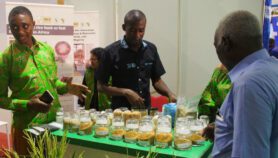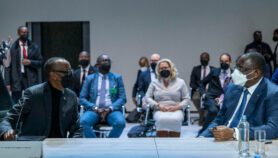Send to a friend
The details you provide on this page will not be used to send unsolicited email, and will not be sold to a 3rd party. See privacy policy.
Listening to the public via citizen ‘juries’ is critical to creating sound science policies, say Alberto Diaz and Ricardo A. Ferraro.
Scientific research and technological development impact almost everything we do, from how we communicate with each other to the food we eat. Their potential for boosting development is even greater, be it through improved crop varieties to cope with climate change or new vaccines against killer diseases such as malaria.
There is a growing consensus that realising this potential requires a participatory approach to science and technology that ensures that research addresses real needs and that its results are widely used.
Experience has shown time and again that communities are more likely to use new technologies if they have had a stake in defining and developing them (see Community ownership is key to nanotech water projects).
To this end, citizen consensus councils (CCCs), also known as ‘citizen juries’, offer a powerful implementation tool. CCCs, first developed in Denmark in the 1990s, are small groups of people brought together to debate key scientific or technological issues and propose policy responses.
Their members are either chosen at random or because together they are demographically representative of their communities.
CCCs hear evidence from a selection of experts and are professionally overseen to reach agreement on how to address the issue at hand. Their conclusions are sent to the relevant authorities and publicised within the populations they represent, usually through the press. They operate much like a jury in that, once their recommendations have been made, they are disbanded.
A promising start
Argentina was an early player in the use of CCCs — known locally as ‘diálogos ciudadanos’ — with its first council launched in Avellaneda, close to the nation’s capital Buenos Aires, in August 2000. The council, titled ‘genetics under debate’, showed that Argentina was ahead of the game in debating such issues, a full year before the unveiling of the first human genome sequence.
Later in 2000, another council was convened to debate ‘genetically modified seeds and foods’ in Pergamino — declared Argentina’s ‘National Capital of the Seed’ because it is home to half the agricultural seed sales within the country.
These were the first CCCs carried out in Spanish, worldwide.
The councils were largely successful in engaging the public. Each jury was made up of 30 local citizens, chosen from around 50 registered to participate, and after regular lengthy meetings over four weeks, each produced a report of their conclusions and policy recommendationsfor submission to municipal authorities.
The organisers, invited experts, participating citizens and municipal authorities were extremely satisfied with the results of these early experiences, providing a solid basis for scaling them up across the country.
Grinding to a halt
And yet the third council, on ‘information technologies and freedom’, scheduled for October 2000, was cancelled and no more CCCs have been held.
Why? Largely, the disbandment of the CCCs was because of the fall from grace of Carlos Álvarez, the nation’s vice president, in October 2000. Álvarez was the project’s biggest supporter and with his resignation came a general reluctance to lead an initiative linked to his name.
But indifference from the media — particularly science editors at major newspapers and television stations — as well as from university leaders in science communication and participatory research was also partly to blame. Innovations in translating scientific knowledge, such as those embodied in CCCs, requires journalists that are open to researching, understanding and communicating new methodologies but these are sadly lacking in Argentina.
The political authorities are also to blame: many politicians did not support using the CCCs’ conclusions to shape their policies — it is well known that Argentinian politicians don’t care about their citizen’s opinions unless they are related to upcoming elections. A rigorous analysis of this apathy needs to be done.
A decade later, as Argentina grapples with legislating and winning public approval for controversial issues such as stem cell research or nanotechnology, it is time to resurrect the CCCs.
They provide a crucial means for gauging public opinion, ensuring that new legislation meets local demands and needs, and for winning public support — aims that should not be stymied simply because their former champion has lost respect.
Politicians must wake up to the great potential that CCCs have for helping them to shape meaningful and effective science policies. And the media must commit to publicising their outcomes — after all, the media should represent the voice of the people. Sadly, this logical sequence is almost like science fiction in today’s Argentina.
Alberto Diaz is director of the Industrial Biotechnology Center at INTI (National Institute of Industrial Technology) and a professor at the National University of Quilmes, Argentina.
Ricardo A. Ferraro is a professor of Policy and Management of Science and Technology at Buenos Aires University in Argentina and a consultant to UNESCO.













